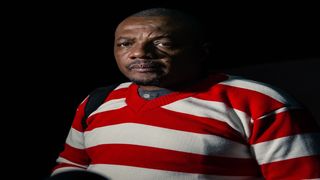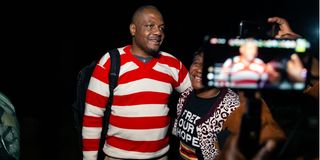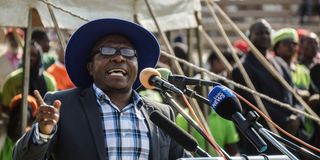
Zimbabwean journalist Hopewell Chin'ono speaks to the press after his release on bail from Chikurubi Maximum Prison in Harare on September 2, 2020.
Africa
Premium
Inside Zimbabwe’s ‘concentration camp': A journalist’s ordeal
What you need to know:
- Hopewell Chin’ono had been arrested alongside the leader of a small opposition party, Jacob Ngarivhume, for planning nationwide protests over corruption and rising cost of living in the southern African nation.
- Both claim they are facing trumped-up charges for criticising President Emmerson Mnangagwa, who is accused of cracking down on dissenters like his predecessor, Robert Mugabe.
An award-winning journalist has likened harsh prison conditions in Zimbabwe to a concentration camp in a description of his 45-day ordeal in detention.
Hopewell Chin’ono, the 2008 CNN African Journalist of the year, was freed from the country’s maximum-security prison last Wednesday, following his arrest in July on charges of inciting public violence.
Chin’ono had been arrested alongside the leader of a small opposition party, Jacob Ngarivhume, for planning nationwide protests over corruption and rising cost of living in the southern African nation.
Both claim they are facing trumped-up charges for criticising President Emmerson Mnangagwa, who is accused of cracking down on dissenters like his predecessor, Robert Mugabe, who died last year aged 95.
The authorities banned the protest, citing Covid-19 regulations, and deployed the army and riot police to disperse demonstrators.

Hopewell Chin'ono is embraced by a supporter following speaking to the press after his release on bail from Chikurubi Maximum Prison in Harare, on September 2, 2020.
The 47-year-old journalist, who was first held at a holding prison in the capital where Mugabe was once detained during the colonial era, was later transferred to Chikurubi Maximum Prison, home to hard-core criminals.
Since independence in 1980, Chikurubi, which is located just over 20km north east of the capital Harare, had especially been used by Mugabe’s administration to lock up critics to try and break their spirit.
The late opposition leader Morgan Tsvangirai and youthful pastor Evan Mawarire who led the #ThisFlag campaign to protest Mugabe’s reign of terror were among detainees at the maximum security prison.
Chin’ono described conditions at the prison as squalid at a time Zimbabwe is battling to contain the Covid-19 pandemic, that has killed more than 200 since March.
People are living as if they are in a concentration camp.
“Chikurubi is one of the worst prisons you can find. People (prisoners) are living as if they are in a concentration camp. They have no masks, people don’t have soap and their relatives cannot visit because of the restrictions that have been imposed by the prison authorities. Life (in the prison) is really horrible and there is no social distancing. A cell with a holding capacity of 16 has more than twice its capacity,” Chin’ono said as he walked out of the jail. Earlier this week, his lawyers said the journalist fell ill and prison authorities had denied him access to medical care.
He blames his arrest on his public campaign on Twitter against corruption in the public service, especially irregular deals in the procurement of Covid-19 personal protective equipment.
“I told my friend Jacob these guys had made a mistake of taking us in there because we have seen things that we only used to hear about. We can now write authoritatively about those things,” Chin’ono said.
Remained defiant
After spending more than six weeks in detention, Zimbabwe’s High Court granted the journalist ZW$10,000 bail (equivalent of US$100) and gagged him from using his Twitter account. He, however, remained defiant, saying he will continue to expose corruption.
Commenting on the gag order, Chin’nono claimed: “It’s part of the dictatorship, that is how they operate. They disable you. The reason I was put inside is that I and other journalists were putting out a lot of information exposing corruption. They have removed me from Twitter and not from Facebook, so I will continue to write on Facebook and now I will write also for local media.”
Ngarivhume, who was granted a ZW$50,000 bail (about US$500), described the charges as trumped up, warning that Zimbabwe, which has been lagging regional peers in attracting foreign direct investment due to policy inconsistency and uncertainty may continue to spook capital. Zimbabwe has for years been on the tail-end of the World Bank Ease of Doing Business index alongside war-torn countries such as Afghanistan.

Transform Zimbabwe leader Jacob Ngarivhume gestures as he addresses a Movement for Democratic Change Alliance launch rally at White City Stadium in Bulawayo in 2017.
And barely a year after officially ditching the United States dollar as the anchor currency for the economy, Zimbabwe’s domestic currency has lost its value, prompting authorities to allow trading in the greenback.
“We are very clear that we are calling for a corruption-free nation, corruption-free society. A society that respects the rule of law. Look here, for 45 days we have been in incarceration, for what? It was wrong to arrest us in the first place and for 45 days, they denied us our freedom. It’s unacceptable. Which investor would come into a country where a government would come against you? It takes you 45 days to get bail, it’s unacceptable,” said Mr Ngarivhume.
'Strengthened us'
“If anything, this whole experience has strengthened us. I was in a cell with convicted persons, some serving 106 years. Half the cell was serving life imprisonment and we learnt to even make friends with such people. Our fight for our rights enabled many of them also to begin to access certain rights from prison. We are also going to stand up for people like that and the nation at large. We are not relenting to call for a corrupt free society, there is no going back.”
Chin’ono owed his freedom to international pressure piled on authorities in Harare. Western diplomats, civil society organisations, the opposition and some of the academia have since his arrest condemned the government for its heavy-handedness.
“I want to thank the rest of the world that stood with us during the 45 days of our persecution. Without the international community we would still be rotting in that prison,” he said as he joined his family waiting for him at the prison gate.





